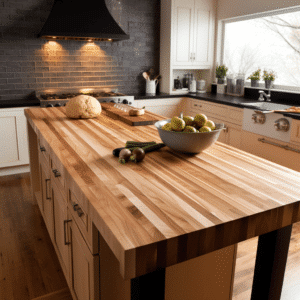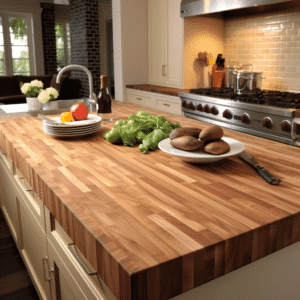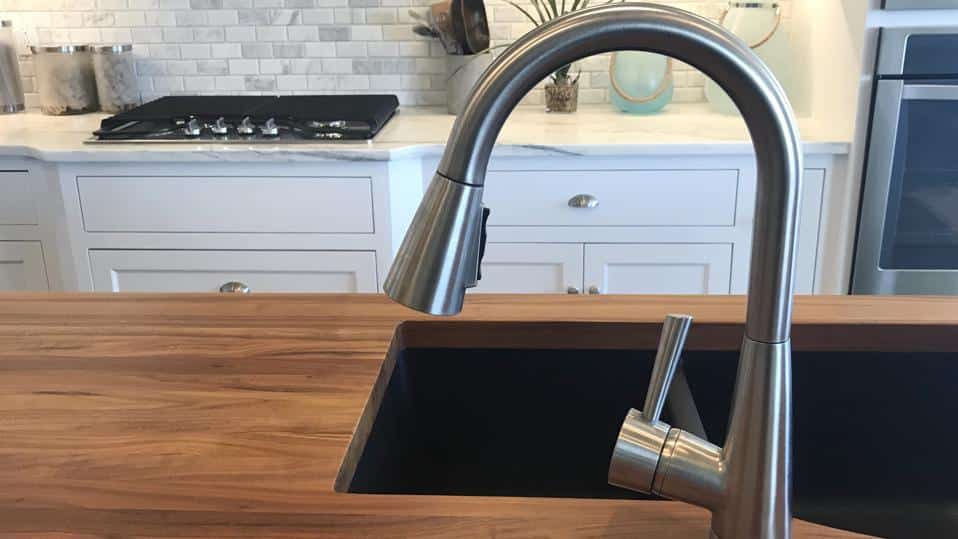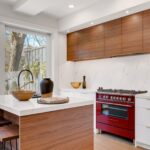Butcher blocks are sturdy, thick, hard, solid wood planks made by joining strips of end-grain wood together to form a single block. They have traditionally been made for butcher shops where meat cleaving and chopping is a heavy-duty practice that the average chopping board cannot withstand.
However, becoming very popular and will increasingly be found in domestic kitchens. They are an aesthetic marvel in the home and create a rustic look that is timeless, elegant, and innately inviting. Butcher block kitchen countertops can withstand cutting and many install them specifically for this purpose.
Butcher block countertops are the only type of countertops that are safe for cutting on but they must be cared for to prevent too much damage. Light cutting involves slicing, dicing, and julienning while heavy cutting involves chopping, deboning, quartering, cleaving, and fileting meats.
Light cutting can be done on your countertops but frequent heavy cutting should probably be done on a dedicated butcher block that can be placed on your countertop.
In the home, most of the cutting that occurs in the kitchen does not rise to the level of disfiguring the board irreparably but long-term use of the boards for cutting purposes may cause surface damage.
Table of Contents
Why Butcher Blocks Can Withstand Cutting

End Grain Surface
Butcher blocks are made from pieces of wood with the end grain surface forming the cutting surface. The end grain is a harder surface making it ideal for cutting on since the rough end of fibers is much harder to cut through and adjusts back into place once a knife-edge has injured the surface.
The fibers on the end grain surface are very closely stacked together forming a harder surface compared to an edge grain surface which is what a cutting board is usually made of.
The thick dimension of a butcher block which is mostly two inches, also adds to the hardness of a butcher block countertop making it a very difficult material to breach or scratch.
Anti-microbial Property of Wood
Plastic has often been touted as the safer option as far as kitchen cutting surfaces are concerned but wood has proven to be just as safe if not safer.
The porous nature of wood in theory should allow wetness to fester within the grain and in the cracks if any, making the wood susceptible to bacterial infestation. The opposite has been observed to be true.
Wood is an organic material and contains oils and chemicals that prevent bacteria from taking root and growing.
Each variety is different but on the whole, no significant danger is posed by the use of wood in this particular way. The porous nature of wood means the surface dries up easily and this also denies bacteria ideal moisture levels needed to thrive.
Maintenance and Repair
If you use your countertop to handle food, you will have to maintain excellent hygiene levels to avoid food contamination. Butcher block countertops are remarkably easy to maintain and only need wiping down with dish soap and water.
Ensure the countertop is always dry when not in use to avoid water damage. If you have been using the countertop extensively, dilute one part white vinegar in four parts water, and with a sprayer, sprinkle and wipe down your countertop.
Butcher block countertops are also the easiest countertop material to repair. If the countertop has sustained cracks and scrapes, it can be sanded down to smooth the surface and restore the even plane. Such scratches do not form easily so repairs are likely to be a rare necessity.
Durable and Hard
Butcher block countertops are usually very hard, which makes them very sturdy. On average, butcher block counters will last for at least 20 years with little care. Even if you use these tables as a cutting board every day, they will last.
The biggest thing that can shorten the life of a butcher block tabletop is letting it get too wet.
If you let water or other liquids sit on your countertops for a long time, they will finally break. It’s easy to keep the area dry, and that should be a top priority.
Does not Blunt Knives

Butcher block countertops are the only surface that is friendly to knives and will not damage the cutting edges of knives.
These countertops also make for a quieter kitchen since wood makes less noise compared to other materials such as quartz. Cutting on butcher block countertops is both convenient and comfortable.
Use Sealant
Using a wood sealant, you can add an extra layer of protection that will create an extra barrier between your countertop and the knife. A sealant creates a plastic-like sheath around your countertop. This surface is non-porous making it even easier to clean and keep dry.
The sealant may, however, create a surface hardness that may be unfriendly to knife edges blunting them when force is used in cutting. If a permanent sealant is not an ideal option for you, then applying food-grade mineral oil every few weeks will work just as well. The idea is to ensure that the unsealed countertop does not dry up so much that it cracks anyway.
Food-grade mineral oil will keep the surface of the countertop supple without soaking it wet. It should only be applied after a vinegar water wash or after a thorough cleaning with regular dish soap and water.
After allowing the surface to dry out, apply the mineral oil to the surface keeping the coat thin and even. This will also protect the countertop from the elements as well as from the impact made by cutting tools.
Finally…
Butcher block countertops may be made to withstand cutting but you also acquired them for their timeless beauty and warmth.
If aesthetics is the most important role your countertops play in your kitchen then it would be prudent to avoid using them as cutting surfaces and simply get a slab of butcher block and cutting boards for this.
If utility is an important factor in choosing these countertops, you do not need to worry about your countertop since domestic use should take considerably long to make significant damage. Keep up maintenance and repair small nicks promptly. Your countertop should give you two decades of service comfortably.


